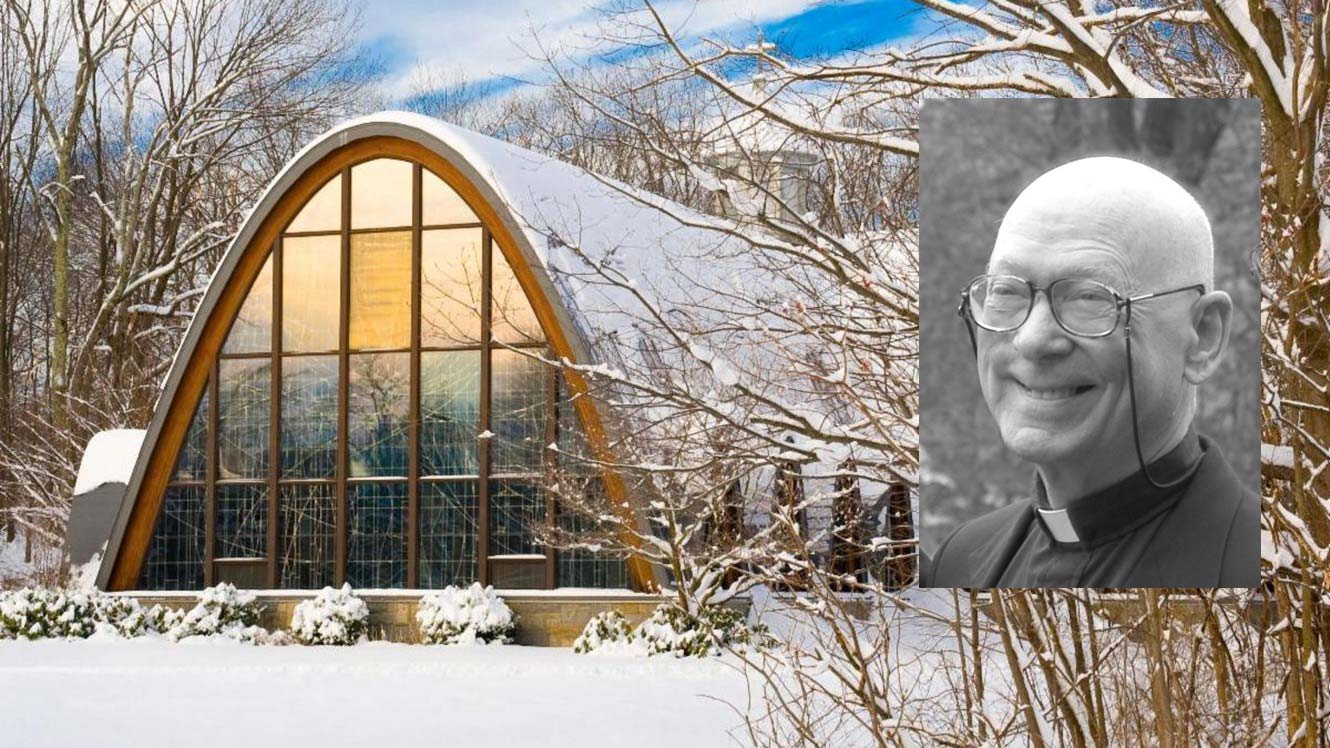MARCH 10, 2023 CHAPEL OF THE HOLY SPIRIT ASSUMPTION UNIVERSITY
Scripture Readings: Job 19, 1, 23-27a; Romans 8:14-23; John 11:32-45
I’m not sure any other Gospel scene brings out the humanity of our Lord quite so powerfully. He weeps over the death of his friend Lazarus, and twice is greatly disturbed in spirit. When we pray at Mass at the conclusion of the Our Father that we be freed from all distress (pertubatio in Latin), included in that are the ways in which we bring distress upon ourselves by our sin. Here we have Jesus, free of the sin of Adam and, because of that, seeing with the clearest eyes and the purest heart – in the death of his friend – the wages of sin. He also has a premonition of what will be necessary to unbind not only Lazarus but all of us from sin’s enslavements. And so he is profoundly moved.
If I may be so presumptuous, let me say a word about Fr. Norman’s humanity, touched as it was by a desire for relationship and also by some of the disturbances, the perturbations, to which our fallen humanity is subject.
My one most memorable personal moment with him: in 2007, I went to St. Anne’s in Sturbridge where he was finding it difficult to climb the stairs into the sanctuary at St. Joachim’s. He was ready to give up being pastor, but he was not ready to retire. I was regional superior at the time, and when I asked him to go to 50 Old English Road, he reluctantly acceded to my request but said, quite adamantly,
“I’m not going there to cash in my chips”… or something to that effect – “I’m not going to die on the vine.” I think he may have been putting his finger into my chest as he said it!
One would be hard-pressed to find a pledge more faithfully kept…
Within months Fr. Norman could be found on stage in the first of several student theater productions either in a cameo appearance – Les Miz comes to mind – or providing backstage technical assistance. As a duck takes to water, he became involved in the WISE program on campus. It was as if WISE had been made for him. In those early years, he was on the regular cycle of presiders and preachers here in the Chapel, instructing us with his cosmological homilies. Before long he was a docent at the Russian Icon museum nearby, and in those days he rarely missed a lecture or a concert on campus. He also convened a reading group of friends from the College and even team-taught a course.
Our old French fathers were familiar with a school of psychology called characterology. One of the secondary qualities in that school’s list of temperaments was something called avidity. If we use the word at all in our common speech, it usually has the sense of enthusiastic, as in “an avid follower.” But its meaning in this context is closer to being hungry – hungry for knowledge, for human connection, for the varieties of human experience. It’s not a bad temperament for a historian, but, more than that, it hits upon a disposition toward life that marked the whole of Norman’s time as an Assumptionist.
His itinerary as a religious took him to Rome for studies, to Jerusalem, to Peru and several other Latin American countries, and alas, to Worcester…
There are particular moments in our lives when grace builds upon nature, and Norman’s acceptance to go to Moscow was one of them: a kind of convergence of his avidity and his Assumptionist vocation to go wherever one is needed. As the last in the line of American Assumptionists to serve in that mission, there he found himself an up-close witness to this world-historical moment: the coming apart of the Soviet Union. But those Moscow years were also an important part of what I will call the pastoral turn in Norman’s priestly life. An important part of this was his coming to know and share fellowship with many African students, taking them under his wing, and staying connected to them even after returning home. Remarkably, two of those former students, one from Ghana and one now in England, are with us today to honor and pray for their former mentor.
One is not saved by one’s temperament, but by the Cross and by one’s participation in it. The many physical afflictions that Norman was asked to bear in recent years I think were especially difficult, but which he did so with a good deal of courage. The loss of his autonomy, his dependence on others he had to learn, not without struggle and anguish. He fought through it all.
Fr. Dinh told me that in the last hours of Norman’s conscious life, he cried quite a lot. It may be, as Dinh noted, that he was experiencing some physical pain. But I’m led to think there may be other reasons: an avid man having to let go of the beauty of this life; among these were his relationships, friends and caretakers who were devoted to him and towards whom he offered a sturdy friendship and companionship; prickly as he could be at times, he was a brother who shared life with his brothers at Old English Road for eighteen years, and Dinh said he wanted to say good-bye to them; may I venture to say the tears may have also been for the person before him, for Dinh himself, whom Norman could not help but see had cared for him deeply. Some tears of remorse, perhaps, but we’ll leave that up to God.
One has reason to hope that he was given some inkling of the avid love that God had for him and his own participation in the unbinding that Christ accomplishes for us all. May he rest in God’s eternal peace.
Fr. Dennis Gallagher, A.A.
Provincial Superior
